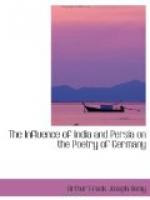Examples might be multiplied. But they would all prove the same thing. India and Persia were magic names to conjure with; their languages and literatures were a book with seven seals to mediaeval Europe.
FOOTNOTES:
[1] Indica, ch. 10.
[2] Var. Hist. xii. 48.
[3] De Homero, Oratio liii., ed. Dindorf, Lips. 1857, vol. ii. p. 165.
[4] Apollonii Vita, iii. 19 et passim.
[5] See Jackson, Zoroaster, p. 8.
[6] See Benfey, Pantschatantra, Vorrede, p. xxiv and note.
[7] See Gaston Paris, La Litterature Francaise au Moyen Age, Paris, 1888, p. 49 seq. A striking illustration of oral transmission is the origin of the tradition about Prester John, for which see Cathay and the Way thither, ed. Henry Yule, Lond. 1866, Hakluyt Soc. No. 36, 37, vol. i. p. 174 and n. 1.
[8] Yule, op. cit. vol. i. pp. 165-167 and p. 197 seq.
[9] Ib. pp. 1-161; Latin text in appendix i of vol. ii.
[10] Mirabilia Descripta, ed. Henry Yule, London, 1863. Hakluyt Society, No. 31.
[11] Yule, Cathay, vol. ii. pp. 311-381.
[12] For their accounts see the publications of the Hakluyt Society, 1859 and 1873. Nos. 26 and 49.
[13] See Paul Horn, Gesch. Irans in Islamitischer Zeit, in Grdr. iran. Phil. II. p. 578 and note 4; also p. 579. See also Bibl. Asiat. et Afric. par H. Ternaux-Compans, Paris, 1841, under the years 1508, 1512, 1514, 1515, 1516, 1535, 1543, 1579, 1583, etc.
[14] English tr. in R.H. Major, India in the Fifteenth Century, London, 1857. Hakluyt Society, No. 22.
[15] Hans Schiltbergers Reisebuch ed. Val. Langmantel (BLVS. vol. 172) Tuebingen, 1885, p. 79: “In der grossen India pin ich nicht gewesen....”
[16] Ibid. p. 164.
[17] Friedr. Kunstmann, Die Kenntnis Indiens im 15^ten Jahrhunderte, Muenchen, 1863, p. 59; Major, op. cit. p. 31.
[18] See Albert Bovenschen, Quellen fuer die Reisebeschreibung des Joh. v. Mandeville, Berl. 1888.
[19] See Graesse, J.G.Th., Lehrbuch einer allgem. Literaergesch., 9 vols., Dresd. u. Leipz. 1837-59, Vol. II. pt. 2, pp. 783-785.
[20] Latin text publ. by Oswald Zingerle as an appendix to Die Quellen zum Alexander des Rudolf v. Ems in Weinhold Germ. Abhandl. Breslau. 1885, pt. iv.
[21] Das Buch der Beispiele der alten Weisen, ed. Wilh. Ludw. Holland, Stuttg. 1860, BLVS. vol. 56.
[22] Piper, H.E. iii. pp. 562-632. Joseph Langen, Johannes von Damaskus, Gotha, 1879, pp. 239-255, esp. p. 252, n. 1.
[23] Piper, H.E. iii. pp. 216-219.
[24] Vetter, Lehrhafte Litteratur des 14. u. 15. Jahrhunderts (KDNL. vol. 12), I. pp. 496-499. For a bibliography of this poem see C. Beyer, Nachgelassene Ged. Friedr. Rueckert’s, Wien, 1877, pp. 311-320. For a translation of the version in the Mahabharata see Boxberger, Rueckert Studien, p. 94 seq. A translation of a Buddhist sutta on the same subject is given in Edm. Hardy, Indische Religionsgeschichte, Leipz. 1898, pp. 72, 73. Cf. also E. Kuhn, in Boehtlingks Festgruss, Stuttg. 1888, pp. 74, 75.




